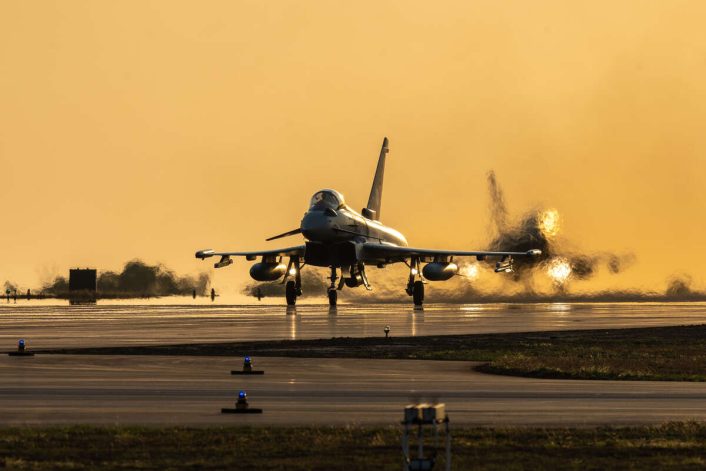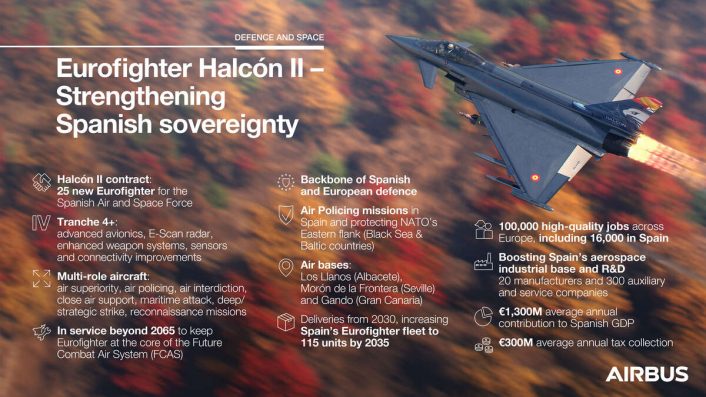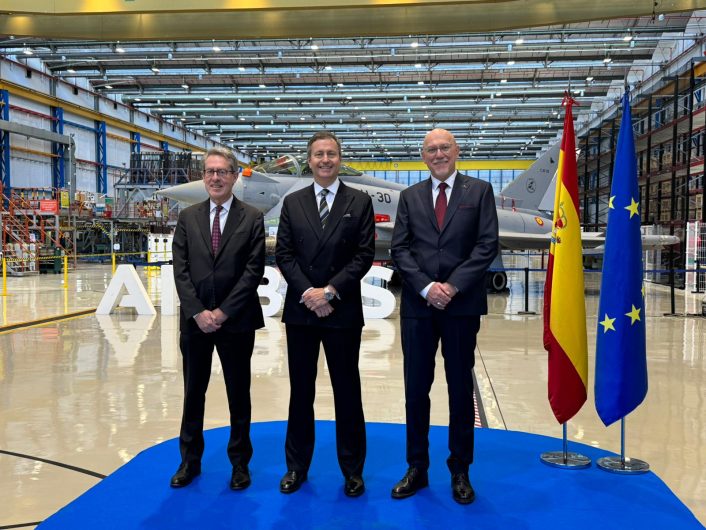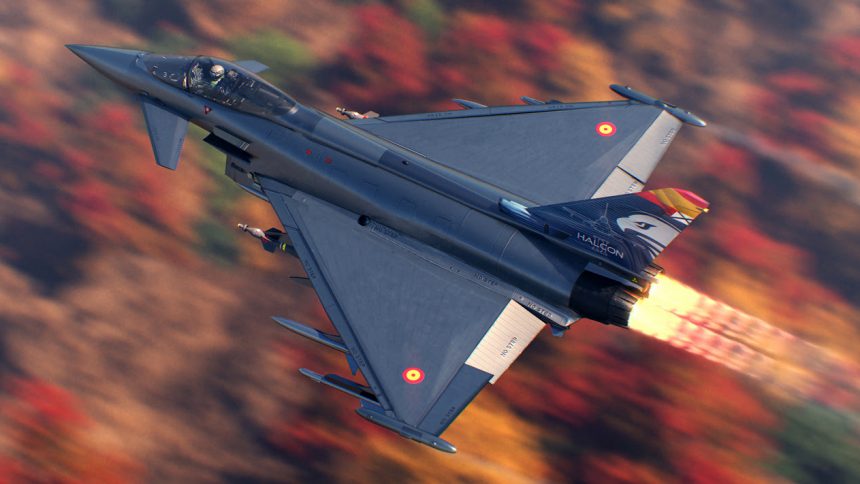The order will bring the Spanish Air Force Eurofighter fleet to 115 aircraft.
The Spanish government has finalized a deal with the NATO Eurofighter and Tornado Management Agency (NETMA), based in Munich, Germany, to purchase 25 Eurofighter jets as part of the Halcon II program. This new order, which was anticipated months ago, includes 21 single-seat and four twin-seat aircraft, which will replace part of the Spanish Air and Space Force’s aging F-18 legacy Hornet fleet, based at Torrejon and Zaragoza.
Building on a prior 2022 Halcon contract for 20 Eurofighters, signed at ILA airshow in Berlin in June 2022, this agreement will bring Spain’s fleet to a total of 115 aircraft. The aircraft are set for delivery starting in 2030. The additional Eurofighters are said to enhance Spain’s air combat capabilities, strengthen its leadership role in NATO, and ensure continued support for the Eurofighter’s industrial base in Europe.
“The Eurofighter is Europe’s leading fighter jet, combining advanced technology and proven success in air superiority. It’s a testament to international cooperation and shows how Europe can collaborate on defense. We deeply appreciate the Spanish government’s trust in the Eurofighter and Airbus Defence and Space. This order isn’t just vital for defense; it also supports the European and Spanish supply chains,” said Mike Schoellhorn, CEO of Airbus Defence and Space.
Spain’s Eurofighters are built, tested, and delivered from Airbus’ facility in Getafe, near Madrid, with the program supporting over 16,000 jobs across Spain. The project involves several key Spanish defense and technology companies in the production process.
The acquisition, approved by Spain’s Council of Ministers in September 2023, and including the aircraft, engines, and essential support services, adds to the momentum building around the Eurofighter program, which is gearing up for more contracts in the near future.

Alongside Spain’s announcement, new orders are expected from Italy and Germany, as well as potential export deals, which could expand the Eurofighter’s order book by 100 to 200 aircraft over the next decade.
Giancarlo Mezzanatto, Eurofighter’s Chief Executive, commented:
“Spain’s decision to order 25 more Eurofighter jets is a milestone in what we see as a ‘renaissance’ period for the program that will carry on well into the 2030s.
“This shows Spain’s deep commitment as one of the four founding Eurofighter nations. We’re proud to see Eurofighter remain Europe’s largest defense program and a standout example of successful international collaboration in defense.
“Beyond enhancing Europe’s security, this new order brings significant economic benefits to our core nations and Europe at large. With its advanced technology and a lifespan extending past 2060, Eurofighter will integrate seamlessly into Europe’s next-gen air combat systems.”
As already explained, under the Halcon II deal, 25 Eurofighter jets (21 single-seaters and four twin-seaters) will be delivered to Spain between 2030 and 2035, ensuring industrial activity continues at least through 2035.
AVM Simon Ellard (ret.), NETMA’s General Manager, said:
“Halcon II marks a significant milestone and highlights Spain’s strong commitment to the Eurofighter program.
These additional jets will not only strengthen Spain’s defense capabilities but also provide major industrial and economic benefits for Spain, the Core Nations, and Europe as a whole.
“The Eurofighter remains at the heart of Europe’s air defense. The Halcon II program, alongside upcoming deals from Italy and Germany, ensures the program’s bright future for decades to come.”
Spain’s new Typhoons will feature cutting-edge technology, including electronically scanned radar (E-Scan), upgraded avionics, advanced weapons like the Brimstone III and Meteor missiles, and improved sensors and connectivity. Noteworthy, recently, the first test flight of the new E-Scan radar took place aboard a Spanish Air Force Typhoon, tail number C.16-70 and registration 14-28 at Getafe Air Base, Spain, one of the largest Spanish Air Force air bases and home of Airbus Spain’s facilities.

From an industrial point of view, the Eurofighter program supports over 100,000 jobs across 400 companies in Europe, “cementing its role as Europe’s largest defense initiative and a cornerstone of the continent’s security and industrial base.”
A PwC report from earlier this year analyzed the program’s development, production, and support activities across the four core Eurofighter nations.
In its “growth scenario,” which includes domestic and export opportunities, the report highlighted the program’s extensive economic impact on Europe. Over the next decade, Eurofighter is expected to contribute €90 billion to Europe’s GDP, generate €22 billion in tax revenues, and sustain nearly 98,000 jobs annually.
Export opportunities
As for the export opportunities, after Germany removed the veto, Saudi Arabia could get 48 new Typhoons to increase its 70-aircraft strong fleet. Eurofighter is also in talks with Poland, which is looking to acquire one or two full squadrons, which equates to 16 or 32 aircraft.
Turkey also expressed interest in acquiring Typhoons: Ankara had long sought 40 Eurofighter Typhoons after it was expelled from the F-35 program in 2020 under the Countering America’s Adversary’s Through Sanctions Act (CAATSA) for its acquisition of the Russian S-400 air defense system. As The Aviationist reported, defense minister Güler told the Planning and Budget Committee late in November that the United States expressed willingness to deliver the six F-35s already built and stored, after seeing Ankara’s progress with the KAAN fighter. Turkey has also reapplied to be admitted back into the F-35 program. Anyway, on Dec. 18, 2024, two Royal Air Force (RAF) Typhoon FGR4 aircraft landed at the Türk Hava Kuvvetleri’s (Turkish Air Force) Mürted Air Base in Ankara, at the presence of top British and Turkish defense officials, for a visit aimed at allowing the Turkish officials to get a closer look at the multirole fighter.
For the past year, there have been ongoing reports about Turkey holding discussions with German and British defense and diplomatic officials regarding the potential sale of Eurofighter Typhoons to Ankara. These talks seemed to have received tentative approvals in principle. Neither Berlin nor London confirmed the reports, but they didn’t outright deny them either.
“After Turkey was removed from the F-35 program, it began exploring other options to meet its need for advanced fighter jets. The Eurofighter Typhoon stood out as a strong candidate thanks to its cutting-edge radar and combat systems,” SavunmaTR reported.
Turkish defense experts believe Ankara is eyeing the Tranche 4 or Tranche 5 version of the Typhoon, similar to those used by European nations. These jets might also come with upgrades from the broader Phase 4 Enhancement (P4E) package, which includes the European Common Radar System (ECRS) AESA radar, the updated Praetorian Defensive Aids Sub-System (DASS), and the Pirate Infra-Red Search and Track (IRST) system.
There have also been rumors about a potential Eurofighter sale to Egypt, but no concrete opportunity has emerged so far.










